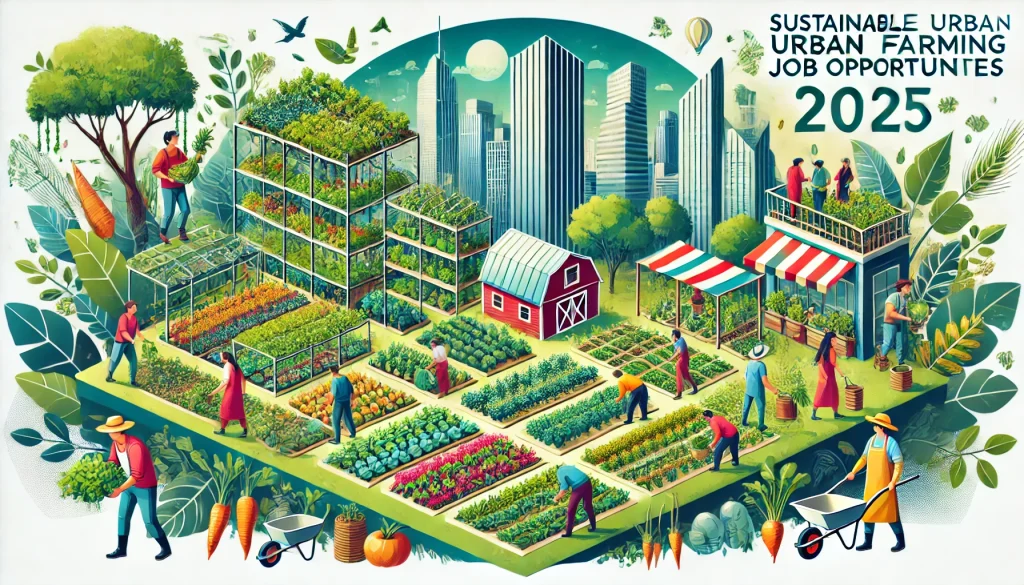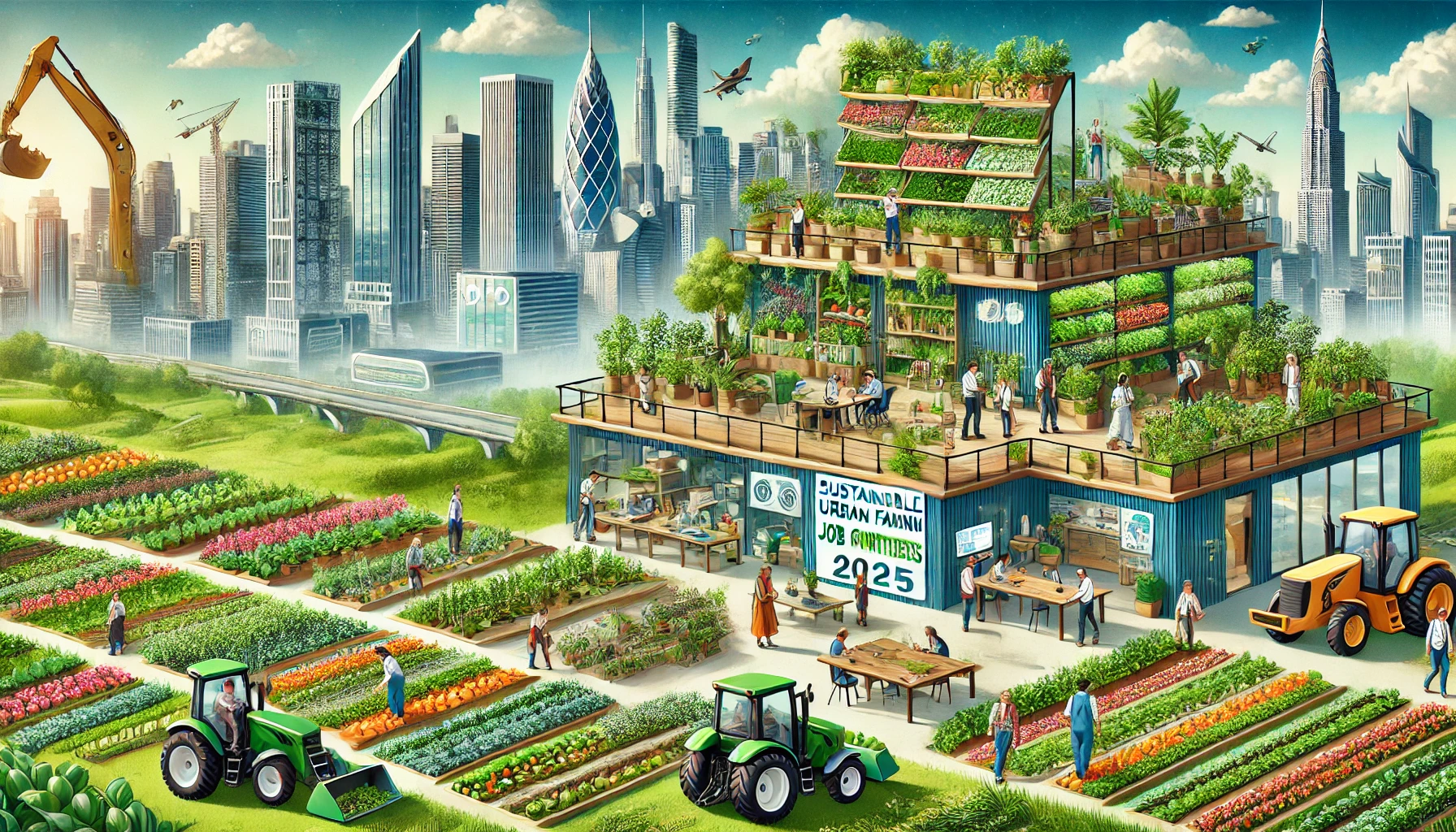Urban farming is growing food in cities, and it’s becoming very popular. With more people living in cities and caring about the environment, sustainable urban farming job opportunities 2025 are important. It creates job opportunities, helps the environment, and ensures we have enough food. In this article, we’ll explore job opportunities in sustainable urban farming in 2025.
What is Sustainable Urban Farming?
Sustainable urban farming involves growing food in cities in ways that are good for the environment. This can be done on rooftops, in community gardens, and even inside buildings using techniques like hydroponics and vertical farming. These methods use less water and space than traditional farming and reduce the need for transportation, lowering carbon emissions.
Why Sustainable Urban Farming?
- Environmental Benefits: Urban farming reduces the need for transportation, cutting down on carbon emissions. It also uses less water and land.
- Food Security: Growing food locally ensures that cities have access to fresh produce, which is crucial during supply chain disruptions.
- Community Building: Urban farms can bring communities together, providing a place for people to work and learn together.
- Economic Opportunities: Sustainable urban farming creates jobs and can stimulate local economies.
Job Opportunities in Sustainable Urban Farming
Urban Farm Manager
Description: Urban farm managers oversee the operations of urban farms. They are responsible for planting, harvesting, managing workers, and ensuring that farming practices are sustainable.
Skills Needed:
- Knowledge of sustainable farming practices
- Management and leadership skills
- Problem-solving abilities
Salary: The average salary for an urban farm manager is around $50,000 per year.
Hydroponic Technician
Description: Hydroponic technicians specialize in growing plants without soil, using nutrient-rich water. They maintain hydroponic systems, monitor plant health, and ensure optimal growing conditions.
Skills Needed:
- Understanding of hydroponic systems
- Technical skills to maintain equipment
- Attention to detail
Salary: Hydroponic technicians can earn around $40,000 per year.
Urban Agriculture Researcher
Description: Urban agriculture researchers study new methods of farming in urban environments. They conduct experiments, analyze data, and develop new technologies to improve urban farming.
Skills Needed:
- Research and analytical skills
- Knowledge of agriculture and sustainability
- Critical thinking
Salary: The salary for urban agriculture researchers ranges from $45,000 to $70,000 per year.
Community Garden Coordinator
Description: Community garden coordinators manage community gardens, organizing volunteers, planning events, and educating the community about sustainable gardening practices.
Skills Needed:
- Organizational skills
- Communication and teaching abilities
- Knowledge of gardening and sustainability
Salary: Community garden coordinators earn around $35,000 per year.
Vertical Farming Designer
Description: Vertical farming designers create and plan vertical farming systems. They work with architects and engineers to design efficient, sustainable urban farms that can be built indoors or in small spaces.
Skills Needed:
- Design and engineering skills
- Knowledge of vertical farming techniques
- Creativity and innovation
Salary: Vertical farming designers can earn between $60,000 and $80,000 per year.
How to Get Started in Sustainable Urban Farming
Education and Training
Getting started in sustainable urban farming often requires some education and training. Here are some steps you can take:
- Take Courses: Many universities and online platforms offer courses in urban agriculture and sustainability. Check out programs at Cornell University and University of California, Davis.
- Gain Experience: Volunteer at a local community garden or urban farm to gain hands-on experience.
- Certifications: Consider getting certifications in sustainable farming practices or hydroponics. Organizations like Urban Farming Institute offer training and certification programs.
Finding Job Opportunities
- Job Boards: Check job boards like Indeed and Green Jobs Online for listings in sustainable urban farming.
- Networking: Join professional organizations like the American Community Gardening Association to connect with others in the field.
- Social Media: Follow urban farming organizations on social media platforms like LinkedIn and Instagram to stay updated on job openings and industry news.
The Future of Sustainable Urban Farming

Sustainable urban farming is expected to grow in the coming years. With advancements in technology and a greater emphasis on sustainability, more job opportunities will emerge. Urban farming can help address food security issues and reduce the environmental impact of traditional agriculture. It’s an exciting field with many possibilities for those interested in making a difference.
Costs of Starting an Urban Farm
Starting an urban farm can vary in cost depending on the scale and methods used. Here are some estimated costs:
- Community Garden: Setting up a community garden can cost between $5,000 to $10,000, depending on the size and materials needed.
- Rooftop Farm: Establishing a rooftop farm can range from $10,000 to $100,000, considering the structural modifications and equipment required.
- Vertical Farm: Building a vertical farm can be expensive, with costs ranging from $500,000 to over $1 million, depending on the technology and infrastructure needed.
Challenges in Sustainable Urban Farming
While sustainable urban farming offers many benefits, it also comes with challenges. Addressing these challenges is crucial for the successful development and implementation of urban farming initiatives.
Space Limitations
Urban areas are often densely populated, with limited available space for farming. Innovative solutions like vertical farming, rooftop gardens, and indoor hydroponics are essential to overcome this challenge. These methods maximize space usage and allow farming in unconventional locations.
High Initial Costs
Starting an urban farm can be expensive, especially when it involves advanced technologies like vertical farming or hydroponics. However, various funding options and grants are available to support urban farming projects. Organizations like the USDA and Sustainable Agriculture Research and Education (SARE) offer financial assistance for urban agriculture initiatives.
Regulatory Hurdles
Urban farming often faces regulatory challenges, including zoning laws and building codes that may not accommodate agricultural activities. Working with local governments to update regulations and create urban agriculture-friendly policies is essential for the growth of this sector.
Climate Control
Maintaining optimal growing conditions in urban environments can be challenging due to temperature fluctuations and limited natural light. Advanced technologies like climate-controlled greenhouses and LED grow lights help mitigate these issues, ensuring consistent crop production.
The Role of Technology in Urban Farming
Technology plays a significant role in the advancement of sustainable urban farming. From precision agriculture to automation, various technological innovations are enhancing productivity and sustainability.
Hydroponics and Aquaponics
Hydroponics involves growing plants without soil, using nutrient-rich water solutions. This method allows for efficient water use and faster plant growth. Aquaponics combines hydroponics with aquaculture, where fish and plants are grown together in a symbiotic system. The fish waste provides nutrients for the plants, and the plants help clean the water for the fish.
Vertical Farming
Vertical farming involves growing crops in stacked layers, often indoors. This method maximizes space and allows for year-round production, regardless of weather conditions. Advanced lighting systems and climate control technologies are crucial for successful vertical farming.
IoT and Automation
The Internet of Things (IoT) and automation technologies are transforming urban farming. Sensors and monitoring systems provide real-time data on plant health, soil moisture, and environmental conditions. Automated systems can adjust lighting, watering, and nutrient delivery based on this data, optimizing growth and reducing labor costs.
Career Pathways in Sustainable Urban Farming
Pursuing a career in sustainable urban farming offers diverse opportunities. Here are some potential career pathways:
Farm Operations
- Urban Farm Manager: Oversees daily operations, manages staff, and ensures sustainable practices.
- Farm Worker: Assists with planting, harvesting, and maintaining crops.
Technical Roles
- Hydroponic Technician: Specializes in maintaining hydroponic systems and ensuring plant health.
- Vertical Farming Engineer: Designs and implements vertical farming systems.
Research and Development
- Agricultural Scientist: Conducts research to improve urban farming techniques and technologies.
- Sustainability Analyst: Analyzes data to develop strategies for enhancing sustainability in urban agriculture.
Education and Outreach
- Community Garden Coordinator: Manages community gardens and educates the public about sustainable farming practices.
- Urban Agriculture Educator: Teaches courses and workshops on urban farming techniques.
Case Studies of Successful Urban Farms
Gotham Greens (New York City, USA)
Gotham Greens operates urban rooftop greenhouses in New York City. They produce fresh, local produce year-round using sustainable methods. Their hydroponic systems use significantly less water than traditional farming, and their greenhouses are powered by renewable energy.
Lufa Farms (Montreal, Canada)
Lufa Farms has built rooftop greenhouses in Montreal, providing fresh vegetables to the local community. Their innovative approach includes rainwater harvesting, composting, and energy-efficient greenhouses. They also deliver their produce directly to customers, reducing transportation emissions.
Growing Underground (London, UK)
Growing Underground operates a subterranean urban farm in London, using hydroponics to grow leafy greens and herbs. Their farm is located in a former air raid shelter, utilizing space that would otherwise be unused. The controlled environment ensures optimal growing conditions and minimal resource use.
Conclusion
Sustainable urban farming presents exciting job opportunities and benefits for cities worldwide. By integrating innovative technologies and sustainable practices, urban farms can contribute to food security, environmental protection, and community well-being. Whether you’re interested in farm management, technical roles, research, or education, there’s a place for you in the future of urban farming.
For those looking to start their journey in sustainable urban farming, consider taking courses, gaining hands-on experience, and exploring job boards and professional organizations. The future of urban farming is bright, and your involvement can help shape a more sustainable and resilient food system.
Explore these additional resources to learn more about sustainable urban farming and job opportunities:
- USDA Urban Agriculture
- Sustainable Agriculture Research and Education (SARE)
- Gotham Greens
- Lufa Farms
- Growing Underground
By staying informed and actively participating in the sustainable urban farming movement, you can contribute to a greener and more sustainable future for our cities.

